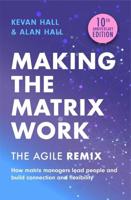Publisher's Synopsis
How can leaders and managers improve employee productivity while still saving time? These below tasks, AI experts ensure that AI can not help any office workers to raise their efficiencies as below:1.Office managers can not delegate to AI to help them to do. While this tip might seem the most obvious, it is often the most difficult to put into practice. We get it-your company is your baby, so you want to have a direct hand in everything that goes on with it. While there is nothing wrong with prioritizing quality (it is what makes a business successful, after all), checking over every small detail yourself rather than delegating can waste everyone's valuable time. Instead, give responsibilities to qualified employees, and trust that they will perform the tasks well. This gives your employees the opportunity to gain skills and leadership experience that will ultimately benefit your company. You hired them for a reason, now give them a chance to prove you right.2.Office managers can not match Tasks to Skills to AI. Knowing your employees' skills and behavioral styles is essential for maximizing efficiency. For example, an extroverted, creative, out-of-the-box thinker is probably a great person to pitch ideas to clients. However, they might struggle if they are given a more rule-intensive, detail-oriented task. Asking your employees to be great at everything just isn't efficient-instead, before giving an employee an assignment, ask yourself: is this the person best suited to perform this task? If not, find someone else whose skills and styles match your needs.3.Office managers can not teach AI to replace them how to communicate and teach their low level staffs how to work effectively. Every manager knows that communication is the key to a productive workforce. Technology has allowed us to contact each other with the mere click of a button (or should we say, tap of a touch screen)-this naturally means that current communication methods are as efficient as possible, right? Not necessarily. A McKinsey study found that emails can take up nearly 28% of an employee's time. In fact, email was revealed to be the second most time-consuming activity for workers (after their job-specific tasks). Instead of relying solely on email, try social networking tools (such as Slack) designed for even quicker team communication. You can also encourage your employees to occasionally adopt a more antiquated form of contact...voice-to-voice communication. Having a quick meeting or phone call can settle a matter that might have taken hours of back-and-forth emails. All of above communication tasks, I believe that AI can not do better than managers in offices.










